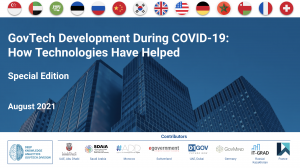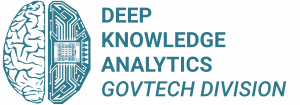GovTech Development During COVID-19: How Technologies Have Helped
Deep Knowledge Analytics, in collaboration with eight partners, highlights the most effective e-government and GovTech solutions implemented during the pandemic
The report considers 14 countries and analyses how technologies helped them to fight COVID-19, highlighting the most effective e-government and GovTech solutions implemented during the pandemic”
LONDON, UNITED KINGDOM, August 10, 2021 /EINPresswire.com/ -- The GovTech Division of Deep Knowledge Analytics announces the release of a 100-page analytical case study, “GovTech Development During COVID-19: How Technologies Have Helped.” Collaboration with the Department of Health Abu Dhabi (UAE), SDAIA (Saudi Arabia), ADD (Morocco), eGovernment (Switzerland), 01Gov (UAE), GovMind (Germany), Win Solutions (France), and IT-Grad (Kazakhstan/Russia) has aided the GovTech division in its analysis of existing tools and solutions that have been implemented or further developed and boosted in response to the pandemic. This helps it to determine the importance and role of government authorities in the creation and implementation of GovTech tools.— GovTech Division of Deep Knowledge Analytics
Link to the Report Overview: www.govtech.global/special-edition-2021
The report considers 14 countries and analyses how technologies in these countries helped them to fight COVID-19. The main goal of the report is to highlight the most effective e-government and GovTech solutions implemented during COVID-19.
In the course of the report, countries were analysed in two directions – the digital solutions introduced in the fight against the consequences of the coronavirus and a comprehensive assessment of the GovTech-related indices in the context of overall development.
The report reviews applications and initiatives by governments in 6 areas: healthcare, citizens’ participation and communication, social distancing and crowd management, business and community, public and social services, e-education, and e-payments.
Some of the analysis’s key takeaways include the following:
- For some countries, the pandemic helped to upgrade existing digital solutions, but for others it showed the need to adopt such solutions.
- The United Arab Emirates has developed robust strategies around digitalisation and transformation that promote innovation, investment in R&D, and the embracing of ground-breaking technologies, especially during COVID-19 (Department of Health Abu Dhabi and 01GOV in Dubai have contributed for in-depth analysis).
- Maintenance of a robust digital infrastructure enabled Saudi Arabia to face a disruptive coronavirus crisis, ensuring the continuity of business and educational operations, meeting citizens’ requirements, and enabling citizens to continue their everyday lives (SDAIA has contributed cases of applications’ implementation within the country for our report).
- Switzerland is making an important contribution to the international discussion about the future of digital space and governance (eGovernment has given cases).
- In 2014, France became the first EU country in digital administration. In recognition of COVID-19, the country has undertaken a number of initiatives to accelerate digital transformation, including providing digital tools and services for businesses, educators, healthcare providers, and citizens (Win Solutions has contributed its cases for our report).
- At the beginning of the pandemic, Germany used mostly international applications. However, the government accelerated internal developments, using inhabitants’ participation in the Hackathon to overcome the challenges of coronavirus (GovMind has contributed its report with startups that offered their solutions during the pandemic).
- In 2020, the topic of digital transformation moved to the strategic agenda in Russia - a series of projects on the use of Artificial Intelligence in the activities of a number of federal executive bodies has started (IT-Grad has contributed its cases for our report).
- Morocco still lags behind European countries by GovTech development; however, significant increases in the number of internet users in the country provide evidence of the success of efforts by the government to establish a digital economy (ADD has contributed to Morocco analysis).
In most of the observed countries, a single health application is used for different aims – for tracking the health conditions of inhabitants; displaying COVID-19 test results; and serving as a contact tracing app, including vaccination documents. Initiatives in business and community areas are divided into apps and platforms to simplify the business process during remote work and to collect all requirements and applications for businesses to receive financial support. Majority of e-payment solutions were developed before the COVID-19 pandemic, mostly in 2017-2018; however, intensive usage began during the pandemic.
COVID-19 has been a catalyst for the use of new technologies in public services in response to the pandemic. Although governments are at very different stages in their journey of digital transformation, more and more countries are implementing transformation plans. Some are driven by modernisation while others are driven by the need to be innovative.
"GovTech Development During COVID-19: How Technologies Have Helped” is the special edition dedicated inclusively to governments’ initiatives during the pandemic.
The GovTech Division of Deep Knowledge Analytics is releasing quarterly reports dedicated to GovTech and electronic governance that will incorporate quantitative analytics and benchmarking on the main types of technologies used by GovTech – including AI and machine learning, IoT, blockchain, robotic automation, and geospatial data analysis – with emphasis on the best examples of their implementation.
About the GovTech Division of Deep Knowledge Analytics
The GovTech Division of Deep Knowledge Analytics is researching the trajectory of the GovTech industry by focusing on factors driving the ongoing transformation of the state, the barriers to this process, and ways to overcome them. It also provides information on the main types of technologies used by GovTech – including AI and machine learning, IoT, blockchain, robotic automation, and geospatial data analysis – with emphasis on the best examples of their implementation, including reduction of bureaucracy and corruption, improvement in automation, transparency, and accountability of information.
About Deep Knowledge Analytics
Deep Knowledge Analytics is a DeepTech-focused agency producing advanced analytics on DeepTech and frontier-technology industries. To do this, DKA uses sophisticated multi-dimensional frameworks and algorithmic methods that combine hundreds of specially-designed and specifically weighted metrics and parameters to deliver insightful market intelligence, pragmatic forecasting, and tangible industry benchmarking.
For press and media inquiries, cooperation, collaboration, and strategic partnership proposals, please contact: info@govtech.global
Alexei Cresniov
GovTech Division of Deep Knowledge Analytics
info@govtech.global
Visit us on social media:
Facebook
Twitter
LinkedIn
In the GovTech report, developed by GovTech Division of Deep Knowledge Analytics, 14 countries are considered about how technologies helped to fight COVID-19.


